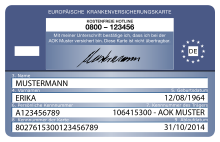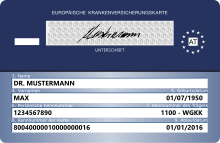Foreign health insurance certificate
A foreign health insurance certificate is the common name for "entitlement certificates" for the use of benefits from the German or Austrian statutory health insurances abroad. In Switzerland it was known colloquially as the E111 form “for a stay abroad”.
The foreign health care has now been replaced in many countries by the European Health Insurance Card ( EHIC , EHIC ).
European Health Insurance Card (EHIC)
Since June 1, 2004, most member states of the European Union and Switzerland have issued the European Health Insurance Card (EHIC). It replaces the E111 forms (“Entitlement to health insurance benefits in kind when staying and traveling in a Member State”), which were repealed on December 31, 2005. In a later phase, other forms will also be replaced by the European health insurance card, namely
- E110 - for international transport
- E119 - for job search
- E128 - for studying and for posting workers to another country
The EHIC is on the back of the Austrian e-card and can be on the back of the German electronic patient card or the health insurance card . The EU Administrative Commission determined the appearance and precise design of the EHIC in a resolution that was published in the Official Journal of the European Union on October 27, 2003 .
Due to the legal structure (and the type and source of funding), the European Health Insurance Card is only issued by statutory, but not by private health insurers .
advantages
Before June 1, 2004, insured persons in foreign EU and EEA states could only claim initial or emergency treatment as benefits. Since June 1, 2004, there has been an entitlement to all medically necessary services according to the requirements applicable in this country.
Since July 1, 2004, there has been no need to go to the competent foreign institution before using medical services. The European health insurance card or the provisional replacement certificate is sufficient as a certificate of entitlement to the practitioner.
Regional scope
German health insurances
In the German health insurance, the principle of territoriality applies, i. H. Benefits are only provided to insured persons within the scope of the law (Section 16 Paragraph 1 Item 1 SGB V). SGB V provides for exceptions to this in the context of what is known as " broadcast " or " radiation ". This applies in particular to employees who are posted abroad from Germany for a limited period of time as part of their employment relationship or - conversely - who are posted to Germany by their foreign employer. They are still subject to their domestic legislation. Regulations of special social security agreements remain unaffected by this.
Countries within the scope of Regulation (EEC) No. 1408/71
In deviation from the principle of territoriality, insured persons are entitled to health insurance benefits in countries in which Regulation 1408/71 applies. These are the countries of the EU and EEA as well as Switzerland, but without the Faroe Islands and Svalbard.
Other countries with social security agreements
In countries outside the scope of Regulation (EEC) No. 1408/71 with which there is a social security agreement in the field of health insurance, German insured persons are entitled to benefits from the German health insurance. In order to claim insurance cover, different holiday sickness certificates or the European Health Insurance Card (EHIC) are required depending on the country .
As of June 2015, there are corresponding agreements with the following countries:
Bosnia-Herzegovina, Israel (pregnancy and maternity benefits only), Morocco (only to check incapacity for work), Macedonia (EHIC is accepted), Montenegro (EHIC is accepted), Serbia (EHIC is accepted), Tunisia, Turkey
The following social security agreements do not contain any regulations for health insurance: Australia, Brazil, Chile, China (posting agreement), India (posting agreement), Japan, Canada / Quebec, Kosovo, Republic of Korea, Uruguay, USA
Other countries without a social security agreement
In countries outside the scope of Regulation (EEC) No. 1408/71 with which there is no social security agreement in the field of health insurance, German insured persons are only entitled to benefits under the very strict requirements of Section 17 SGB V and Section 18 SGB V.
In Europe this includes B. Kosovo, Albania, Belarus, Ukraine, Russia, Monaco and Andorra.
Austrian health insurances
In countries outside the scope of Regulation (EEC) No. 1408/71, Austrian insured persons are only entitled to benefits from their health insurance if there is a social insurance agreement with these states in the area of health insurance. The use of insurance cover requires different holiday sickness certificates depending on the country. There are bilateral agreements with the following countries:
Bosnia-Herzegovina, Montenegro, Serbia, Turkey
On June 27, 2012, the Social Committee of the National Council approved a new agreement with Serbia, which is intended to replace the agreement that was concluded between Austria and Yugoslavia and which has so far been applied pragmatically. In terms of content, no significant changes are planned, only in individual details, for example with regard to data protection and the compulsory insurance for diplomatic personnel, adjustments have been made to similar, more recent agreements with other countries. At the same time, the committee decided to terminate the agreement with Kosovo on the continued use of the Yugoslav Agreement. As a result, there is currently no social security agreement with Kosovo.
There is also an agreement with Macedonia, but the European health insurance card has been in effect there since January 2013, which is why a foreign health insurance certificate is no longer required.
Scope of insurance coverage
The scope of the insurance claim abroad depends on the respective national law. This can result in a significantly higher cost sharing than in Germany. Depending on the country, this can include both fixed amounts (additional payments) and percentages of up to over half of the costs. Country-specific information sheets from the German Liaison Office for Health Insurance Abroad (DVKA) provide information on the specific scope of insurance cover.
In principle, the return transport of the sick from abroad to the Federal Republic of Germany is not to be covered by the health insurance company (Section 60 (4) SGB V).
For the reasons mentioned, private foreign health insurance is still recommended even when traveling to countries within the scope of Regulation (EEC) No. 1408/71.
It can happen that the practitioner does not accept the certificate of entitlement or the European health insurance card and issue a private bill that is to be paid immediately, which is only partially reimbursed by their own health insurance company due to higher fee rates. In some countries (e.g. France, Belgium) private bills are also common for those with health insurance there. However, if direct billing with the health insurance is required for those insured there, the practitioner should be informed of the applicable law. However, many doctors do not know this right. In the event that the foreign statutory health insurance doctor (private doctors are not obliged to do so) does not accept this, you should ask him to contact his regional health insurance company, who have been informed (or contact the foreign health insurance company directly). If you pay directly, on the other hand, as an Austrian, you only get 80% of the costs reimbursed, even if the tariffs charged are not higher than in Austria.
Organizational implementation
In Germany, the German Liaison Office for Health Insurance - Abroad (DVKA) was responsible for implementing EU law and the intergovernmental social security agreement for the entire statutory health insurance system, for example for cost accounting with domestic and foreign bodies. Since the health reform came into force in 2007, the relevant tasks have now been carried out by the DVKA department of the National Association of Health Insurance Funds .
According to EU law, the introduction of the EHIC had to be implemented in the member states on June 1, 2004. A corresponding card was not yet available in Germany on this date, rather the German health insurance companies issued a replacement certificate. This is valid in all member states of the Union. The card can now be requested from almost all health insurers online by entering your own membership number and other personal data, or it will be sent to the insured when the health insurance card is exchanged. If necessary, the provisional replacement certificate can still be used.
Insured information
The “European Health Insurance Card” smartphone app (iOS, Android, Windows Mobile) provides instructions on how to use the European Health Insurance Card in the 28 EU member states as well as in Iceland, Liechtenstein, Norway, Macedonia and Switzerland. It contains general information about the insurance card, emergency numbers, the treatments and costs covered, the reimbursement procedure and contacts in the event that the EHIC is lost. The instructions are available in 24 languages.
See also
Web links
- German liaison office
- European Commission: The European Health Insurance Card (German)
- European Commission: The European Health Insurance Card (English)
Individual evidence
- ↑ Overview of the e-forms . Accessed May 8, 2014.
- ↑ The European health insurance card on chipkarte.at. Accessed July 19, 2012.
- ↑ Decision No. 190 of June 18, 2003 regarding the technical characteristics of the European health insurance card (2003/752 / EC) .
- ↑ The EHIC applies here . Accessed May 8, 2014.
- ↑ Auslandsbetreuungsschein on wgkk.at. Accessed July 19, 2012.
- ↑ Parliament correspondence No. 548 of June 27, 2012 on parlament.gv.at.
- ↑ Country fact sheets of the DVKA , accessed on August 16, 2010.
- ↑ DVKA: Who we are. ( Memento from December 12, 2010 in the Internet Archive )
- ↑ Healthcare. Smartphone app for stress-free travel this summer. Press release of the European Commission of June 5, 2012.


